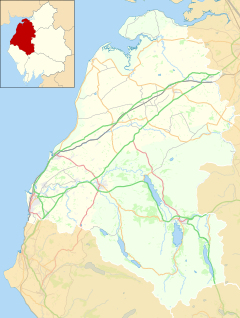| Aspatria | |
|---|---|
 St Kentigern's Church | |
Location within Cumbria | |
| Population | 2,834 (2011)[1] |
| OS grid reference | NY145417 |
| Civil parish |
|
| Unitary authority | |
| Ceremonial county | |
| Region | |
| Country | England |
| Sovereign state | United Kingdom |
| Post town | WIGTON |
| Postcode district | CA7 |
| Dialling code | 016973 |
| Police | Cumbria |
| Fire | Cumbria |
| Ambulance | North West |
| UK Parliament | |
Aspatria /əsˈpeɪtriə/[2] is a town and civil parish in Cumberland, Cumbria, England. The town rests on the north side of the Ellen Valley, overlooking a panoramic view of the countryside, with Skiddaw to the South and the Solway Firth to the North. Its developments are aligned approximately east–west along the A596 Carlisle to Workington road and these extend to approximately 2 miles (3.2 km) in length. It lies about 8 miles (13 km) northeast of Maryport, a similar distance to the Southwest of Wigton, about 9 miles (14 km) north of Cockermouth and 5 miles (8.0 km) from the coast and Allonby. It comprises the townships of Aspatria and Brayton, Hayton and Mealo, and Oughterside and Allerby, the united area being 8,345 acres (3,377 ha); while the town takes up an area of 1,600 acres (647 ha). In earlier days a Roman road leading from "Old Carlisle" to Ellenborough passed through the hamlet.
The population has greatly increased since the mid-19 century. In 1801, the village comprised 98 dwellings with a population of 321. By 1851, there were 236 family entities, comprising 1,123 residents; by 1871, the numbers had increased to 1,778; and twenty years later stood at 2,714. By the start of the 20th century, the population had risen to 2,885; twenty years later it peaked at 3,521. Although the population slumped in the 1930s to 3,189, it recovered to 3,500, in 1951; and by 1981, the population appeared stable at 2,745. It is served by Aspatria railway station. Aspatria is located on the fringe of the English Lake District.
The parish church of St Kentigern was completed in 1848. Fragments of masonry and crosses from earlier structures on the same site are preserved there.
- ^ "Parish population 2011". Archived from the original on 4 March 2016. Retrieved 16 June 2015.
- ^ "Northern yet to fix Aspatria mispronunciation". BBC News. 5 February 2024. Retrieved 5 February 2024.

